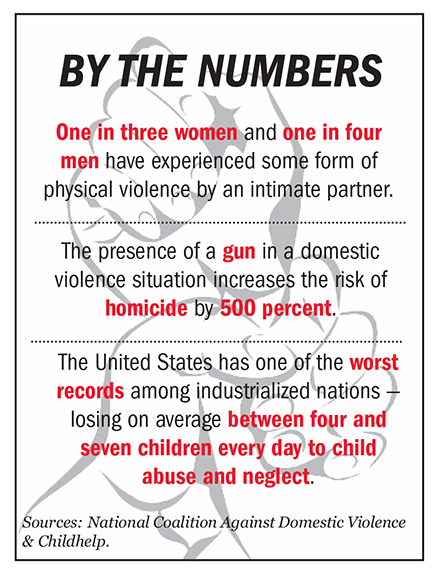Editor’s note: In last week’s UP, we took a look at the causes of domestic violence and how it begins. This week, we take a look at the lasting impact.
 C. Brennan left her abusive household at 20. She started her own family and a very unhealthy relationship filled with infidelity by her husband and “gaslighting” — a tactic used to manipulate someone into questioning their own sanity, she said.
C. Brennan left her abusive household at 20. She started her own family and a very unhealthy relationship filled with infidelity by her husband and “gaslighting” — a tactic used to manipulate someone into questioning their own sanity, she said.
“I did not realize how I was impacted except for my struggle with nightmares and rage,” Brennan said. “I lived in utter terror until I was 28. Every night was hellish, but I did not connect it with my childhood.”
Brennan’s mother divorced her father several years after Brennan left home, but he continued to psychologically abuse his daughter until his death in 1995. She was 28.
“After his death, I spent one full year in a deep depression with some level of psychosis,” she said. “In that way, he still exercised a level of control and oppression over me.”
Brennan said that she has come to expect disaster out of everything and that depression became her constant companion. She is receiving treatment for her trauma, though.
“When I was 47 and attending Princeton Theological Seminary, I fell apart completely,” she said. “I sought help from a therapist, and she identified my symptoms as those of complex posttraumatic stress disorder and developmental trauma.
“In hindsight, I know that self-loathing, distrust of people, despair, anxiety, disassociation, depression and suicidal ideation were all symptoms of the trauma I experienced.”
Brennan said that she is now functional and has accomplished many things that she is proud of, but that she still avoids touch and being in groups of people if possible, and hates people looking at her. It’s a process that she’s constantly working through.
“I learned some calming techniques that I continue to use,” she said. “I talk about my feelings with my partner. I explain the symptoms and try to regulate them with acceptance and exercise.
“I also continue to educate myself and learn more about trauma and how to alleviate suffering and the symptoms. I have a lifelong commitment to accepting how I dealt with my trauma and learning how to heal. I fail constantly and feel overwhelmed, but I try to show myself grace and just keep going.”
Kaleb Dixon said that he wished he had got professional help, but that he did find comfort in his church community.
“I became super introspective and reflected on my life and everything that had happened to me,” he said. “I decided I can do this by myself, I don’t need anyone, and I can do life alone. It was very hard for me to even leave my bed. I remember washing my clothes for the first time since I left her, and being like, ‘OK, my clothes don’t smell like that apartment anymore.’ I remember that being a really big moment.”
Marie Murray said the most important thing a loved one can do for a victim of domestic violence is just to listen.
“The person doesn’t necessarily want to hear what you have to say about the situation,” she said. “They just want to know that you’re there as a support system. You should listen to how they’re feeling and where they are, and let them know that you support them and are not there to judge them.”
Dixon said that if there’s one thing he’s learned from his experience, it’s that people shouldn’t rush into relationships.
“Taking the time to get to know someone is extremely important and I can’t stress that enough,” he said. “Look out for people that want to move too fast into a relationship or get you to commit to them fully, whether that be financially or anything.”
Brennan said that the trauma of domestic abuse becomes a generational issue that needs to be addressed.
“Not only do abusers have their own history of abuse, but the symptoms from developmental trauma and complex PTSD are passed from generation to generation in the form of broken parenting,” she said. “My fear of being touched, anxiety, depression and rage impacted my ability to parent and have deeply affected my children.
“Traumatized mothers cannot connect properly to their children who then experience unhealthy attachment or none. Even if traumatized mothers do not abuse their own children, they cannot create the proper emotions, behaviors or environment for their children to develop a self in a healthy manner.
“The consequences of domestic abuse are much greater and longer lasting than most people realize, and the mental health and medical professions are under-educated about this kind of trauma and do not have the resources needed to fully address the issues.”
If you or someone you know is in an abusive relationship, contact The National Domestic Violence Hotline at 1-800-799-3224, or visit their website at www.thehotline.org for more information.
Students can make appointments at the health center by calling 880-8466, emailing dept_healthcenter@lamar.edu Students can also visit www. lamar.edu/students/student-engagement/student-health-center.
